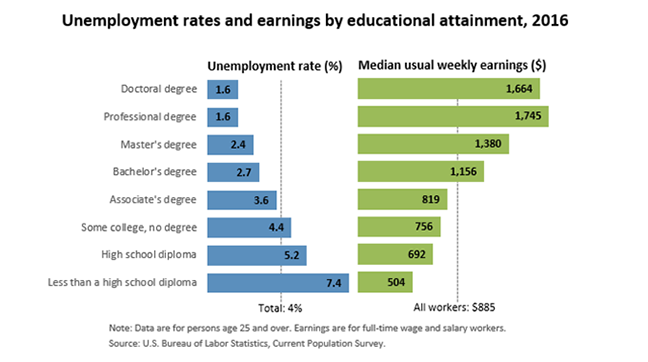By far the most reliable![]() way to raise Michiganders’ household income is increased education attainment. The table below makes clear: the higher one’s education attainment the more one works and earns. The most reliable path to a good-paying career is with a bachelor’s degree or more, in both STEM and non-STEM fields.
way to raise Michiganders’ household income is increased education attainment. The table below makes clear: the higher one’s education attainment the more one works and earns. The most reliable path to a good-paying career is with a bachelor’s degree or more, in both STEM and non-STEM fields.
The power of education attainment in raising one’s income has been growing for decades. The odds are great that the income gap by education attainment will continue to widen.
Clearly not all good-paying jobs require a four-year degree. There are many good-paying jobs that can be obtained with an associate’s degree or occupational credential. But the preponderance of good-paying jobs are going to those with four-year degrees or more.
Those who will do the best in a labor market characterized by accelerated creative destruction are those who have the agility and ability to constantly switch occupations. The notion of a career ladder––predictable and linear steps upward––in a world that is constantly changing is obsolete. Rather people will need to be like rock climbers––constantly adjusting to new opportunities and challenges, and then resourceful to take advantage of those opportunities. Add to that increasingly the ability to be your own employer. Finding good-paying work and good benefits and managing your own finances. These are the kind of skills that are developed best by earning a four-year degree, particularly in the liberal arts.
Unfortunately Michigan is a national laggard in education attainment. Consistently ranking in the thirties among states in the proportion of adults with a four-year degree or more and even lower in K-12 student achievement.
Many believe that Michigan’s low student achievement is largely a result of what children bring with them to school, not poor schools. That family and neighborhoods trump schools. Families and neighborhoods, of course, matter. But the reality is, across the country, there are many early childhood programs (both home based and center based); K-12 school districts (both traditional public and charter); and higher education institutions that are demonstrating that quality education can get high student outcomes no matter what the students’ background.
One can make a strong case that we have a human development system that tolerates high levels of student failure. Too many kids leaving early childhood programming not ready for kindergarten; way too many students leaving high school not ready for post-secondary education; far too many who enroll in post-secondary institutions failing to earn a degree or even a meaningful credential. If anything the performance of the adult training system is even worse with very low completion rates and many who do complete not finding good-paying work.
We need to both raise the bar so that all education institutions are accountable for meaningful success of their graduates and that those held most accountable are those in charge of the institution/enterprises. Policy incentives should drive–-not discourage––all education providers to serve well children growing up in non-affluent households.
Our education policy recommendations are built on two core principles:
First, that all children deserve the same education no matter whom their parents are. Without that we cannot live up to the core American value of equal opportunity for all. We are on the opposite track at the moment as both a country and a state.
The education that is provided for affluent kids is, by and large, designed and executed differently than it is for non-affluent kids. One system delivers a broad college prep (dare we say liberal arts) education, the other delivers an increasingly narrow education built around developing discipline and what is on the test or to narrowly preparing non-affluent children for a first job.
The second is that none of us have a clue what the jobs and occupations of the future will be. Today’s jobs are not a good indicator of what jobs will be when today’s K-12 students finish their careers in the 2050s or 2060s. We simply don’t know how smarter and smarter machines are going to change labor markets. So the purpose of pre K-12 education (maybe even pre K-16) is to build foundation skills that allow all Michigan children to have the agility and ability to constantly switch occupations. To be successful rock climbers.
To thrive in the new economy, workers have to be adaptable, have a broad base of knowledge, be creative problem-solvers and be able to communicate and work well with others. In other words, workers need to be really good at all of the non-algorithmic skills computers aren’t good at yet.
The best definition we have found for this complex set of skills comes from the book Becoming Brilliant, by learning scientists Roberta Michnick Golinkoff and Kathy Hirsh-Pasek, who label these skills the six Cs: collaboration; communication; content; critical thinking; creativity; and confidence.
These are the skills students will need in order to complement rather than be replaced by machines, solve today’s problems, and create new solutions to problems we can’t yet envision.








